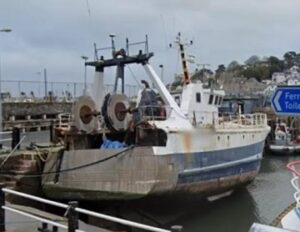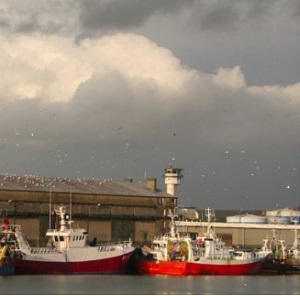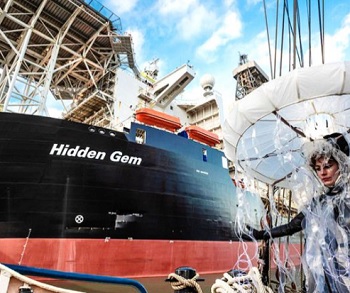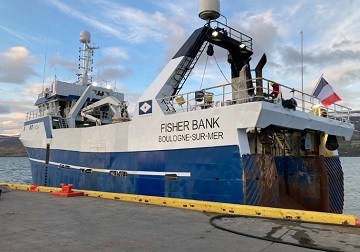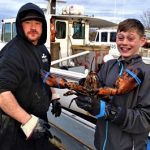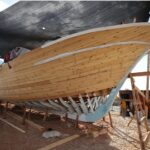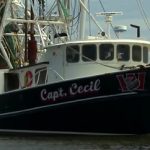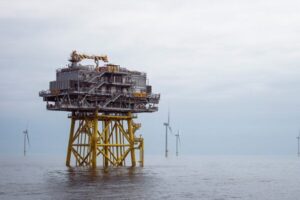Tag Archives: France
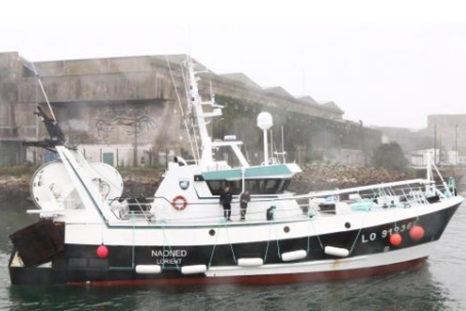
Pioneering decarbonisation
Following his initial experience of the Pilothy project, a feasibility study into converting trawler Anita Conti to run on hydrogen, Loctudy trawler operator Julien Le Brun went back to naval architect Coprexma for another decarbonisation project. The 17.50-metre trawler L’Amour de la mer (ex-Magali) is to serve as a technological platform to test hybrid electric propulsion and equipment systems. The Startijenn Up project aims to demonstrate the effectiveness of existing decarbonisation options that can be integrated on board. The vessel will be outfitted with two Caterpillar generators, providing power to the electric propulsion motor, the electric winch motors and for on-board consumption. Depending on the requirement, consumption will be optimised by running on one or both groups. 100% electric mode can be used for part of the operations. more, >>click to read<< 09:20
Farmers, Fishermen & the Far-Right: An Unlikely Alliance in Rural Europe
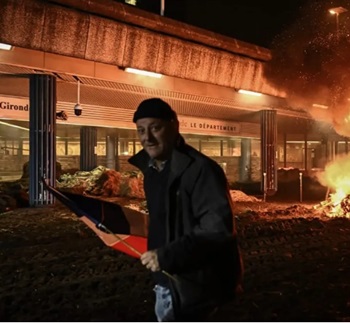 Farmers and fishermen in rural Europe form an unlikely alliance with the far-right to protest against globalization, immigration, and policies threatening their livelihoods. This complex narrative unveils the struggle for survival, identity, and sovereignty in an ever-globalizing world. In the heart of France’s rural expanse, a surprising alliance is taking shape, one that threads through the quiet towns across Europe and stretches its roots deep into the soil of global discontent. Farmers, the bedrock of our sustenance, find themselves in an unlikely camaraderie with fishermen and factions of the far-right, united not by ideology but by a shared sense of siege. more, >>click to read<< 07:03
Farmers and fishermen in rural Europe form an unlikely alliance with the far-right to protest against globalization, immigration, and policies threatening their livelihoods. This complex narrative unveils the struggle for survival, identity, and sovereignty in an ever-globalizing world. In the heart of France’s rural expanse, a surprising alliance is taking shape, one that threads through the quiet towns across Europe and stretches its roots deep into the soil of global discontent. Farmers, the bedrock of our sustenance, find themselves in an unlikely camaraderie with fishermen and factions of the far-right, united not by ideology but by a shared sense of siege. more, >>click to read<< 07:03
Month-long closure paralyses Lorient fleet
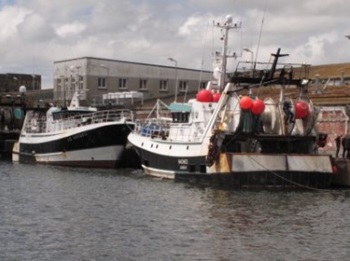 Following the decision by the French Council of State to order a closure of fishing grounds in the Bay of Biscay to protect cetaceans, more than half of the Lorient fleet expects to remain tied up until the end of February. The closure applies to around 450 gillnetters, pelagic trawlers and other fishing vessels from 22nd January to 20th February, throughout the Bay of Biscay, as well as applying to fishing vessels operating under other flags. The measure is affecting around forty of the Lorient Keroman fleet, and the effects go down the chain to hit the port’s seafood trade. more, >>click to read<< 20:27
Following the decision by the French Council of State to order a closure of fishing grounds in the Bay of Biscay to protect cetaceans, more than half of the Lorient fleet expects to remain tied up until the end of February. The closure applies to around 450 gillnetters, pelagic trawlers and other fishing vessels from 22nd January to 20th February, throughout the Bay of Biscay, as well as applying to fishing vessels operating under other flags. The measure is affecting around forty of the Lorient Keroman fleet, and the effects go down the chain to hit the port’s seafood trade. more, >>click to read<< 20:27
Vessel Review: French Owner’s New Scallop Trawler to Operate in the Englis Channel
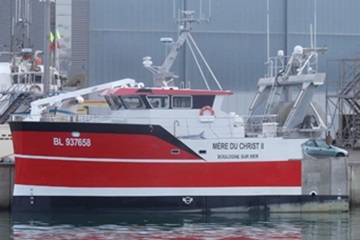 French boatbuilder Plasti-Peche recently delivered a new trawler to father and son fishers Thierry and Martin Ramet based in the port city of Boulogne-sur-Mer on the northern coast of France. Mere du Christ II (“Mother of Christ II”) was designed by local naval architect Coprexma primarily for the bottom trawling of scallops, taking over the role once performed by the owners’ earlier boat, the 1992-built Mere du Christ. The bespoke vessel’s main area of operations encompasses the portion of the English Channel that stretches from Boulogne to the Seine Estuary, where it will trawl for scallops from October to January. For the remainder of each year, the crew will focus on catching squid and sardines. Photos/specifications, more, >>click to read<< 11:05
French boatbuilder Plasti-Peche recently delivered a new trawler to father and son fishers Thierry and Martin Ramet based in the port city of Boulogne-sur-Mer on the northern coast of France. Mere du Christ II (“Mother of Christ II”) was designed by local naval architect Coprexma primarily for the bottom trawling of scallops, taking over the role once performed by the owners’ earlier boat, the 1992-built Mere du Christ. The bespoke vessel’s main area of operations encompasses the portion of the English Channel that stretches from Boulogne to the Seine Estuary, where it will trawl for scallops from October to January. For the remainder of each year, the crew will focus on catching squid and sardines. Photos/specifications, more, >>click to read<< 11:05
AVENTURINE – Locally Built Trawler/Crabber for French Fishing Company
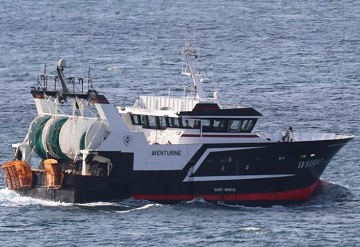 French family-owned fishing company Armement Porcher recently took delivery of a new trawler and crab fishing vessel built by compatriot shipyard Socarenam. Named Aventurine, the Coprexma-designed vessel is the sixteenth to be built by Socarenam for the same owner. The new trawler will be homeported in Saint-Brieuc in Brittany. It will be operated for periods of between one and three weeks primarily in the western portion of the English Channel as well as in the Irish Sea to fish for squid, monkfish, and crabs. Photos, >click to read< 07:49
French family-owned fishing company Armement Porcher recently took delivery of a new trawler and crab fishing vessel built by compatriot shipyard Socarenam. Named Aventurine, the Coprexma-designed vessel is the sixteenth to be built by Socarenam for the same owner. The new trawler will be homeported in Saint-Brieuc in Brittany. It will be operated for periods of between one and three weeks primarily in the western portion of the English Channel as well as in the Irish Sea to fish for squid, monkfish, and crabs. Photos, >click to read< 07:49
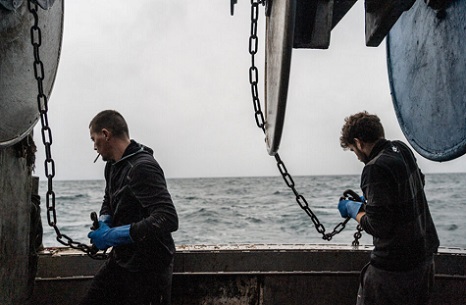
Farmers and Fishermen: In the Sweat of Their Brow
I tried to put my finger on the pulse of the world in order to understand what ties these farmers to their land and these fishermen to the sea. I went wherever life erupts: to a pasture where a farmer slowly prods his cattle along, into the shade of a stable… 3PM. I embark for the first time on board of the trawler Alcyon 2. Cézembre and Samy are mending the fish nets, while Thierry begins to maneuver. The anchor is raised. The lights of the port fade away little by little. In the cabin, Samy is brewing 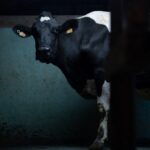 coffee. The down comforters are laid out for the night. 3AM. The sound of metal clanking under the chains. Samy and Cézembre take a few seconds to slip on their fishing gear before heading back to the stern. Back on land, at the La Vallée café in Quintin. The oldest of the farmers is leaning against the counter, a scarf pulled over his head. He is a regular. This is the local watering hole. The morning light timidly pierces the mist. Photos, >click to read< 17:54
coffee. The down comforters are laid out for the night. 3AM. The sound of metal clanking under the chains. Samy and Cézembre take a few seconds to slip on their fishing gear before heading back to the stern. Back on land, at the La Vallée café in Quintin. The oldest of the farmers is leaning against the counter, a scarf pulled over his head. He is a regular. This is the local watering hole. The morning light timidly pierces the mist. Photos, >click to read< 17:54
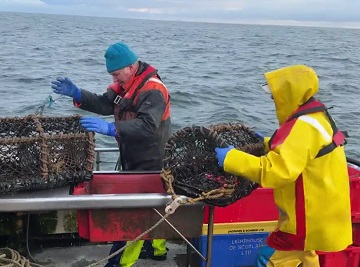
A Crab’s Eye View of Brexit
Of all the vexing regulations that Brexit has thrust upon Paul Knight’s shellfish exporting business, the one he finds most absurd is this: Before he can deliver his crabs and lobsters to France and Spain, they must be certified by a veterinarian. Before Brexit that was relatively simple. But now, because of all the extra paperwork required, Alastair Mackie, the Dignity Jay’s skipper, must deliver his shellfish earlier. So he will finish fishing by 11.30 a.m., rather than 5 p.m., to get his catch on a ferry from the Isle of Mull to Oban on the Scottish mainland. Each week, the early finish cuts one day’s catch in half. When it took full effect, in January 2021, Brexit ended an era of easy trade with his markets in continental Europe. >click to read< 12:34
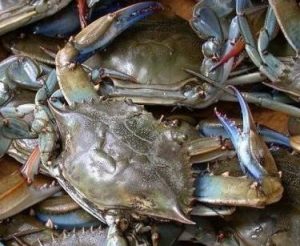
‘They are serial killers’: How blue crabs are devastating the fishing industry in southern France
For the last three years, the Canet-en-Roussillon lagoon, in southern France, has been under invasion from a blue crab which devours almost everything in its path. Scientists are trying to find the cause of the invastion, but for the time being the only way to keep the numbers under control is fishing. Since the crab tastes so good, local restaurant owners are considering putting it on the menu. Since the invasion began in 2020, the two friends (Yves Rougé and Jean-Claude Pons) have meticulously noted down the number of blue crabs they have caught. “We started seeing them in 2017, it’s been five or six years since they’ve been here,” explains Jean-Claude Pons. “We used to see one or two, then ten, and then it was kilos every day.” >click to read< 10:07
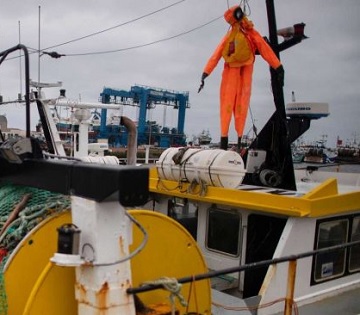
“Dead Days” In French Ports To Protest Against Fuel Prices And The Limitation Of Fishing Areas
Not a boat at sea, not a fish sold, no fish trade, no processing. For the first time, the National Fisheries Committee calls for dead days in French ports to demand from the government answers to a series of“attacks” weakening the sector, in a climate of tensions never seen since the Brexit crisis. From Boulogne-sur-Mer to Sète via Brest, hundreds of fishermen angry at the regulations launched an unprecedented “dead sector” operation on Thursday. For several days, the anger has been mounting: muscular demonstrations in Rennes or even Lorient, blockages in Boulogne-sur-Mer since Sunday then closure of the auction, awareness-raising operations, with distribution of fish in Capbreton … >click to read< 07:49
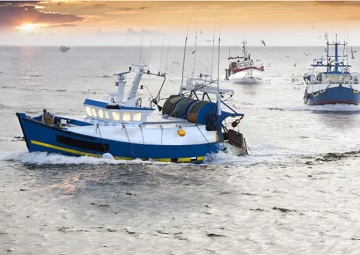
French fishermen begin two-day strike to highlight ‘plague of crises’
Many French fishermen have begun a two-day strike to highlight a “plague of crises” hitting their sector, including EU regulation and post-Brexit turmoil. They are being called to walk out on Thursday (March 30) and Friday (March 31) to call for more government support. Industry group le Comité national des pêches (CNP) says the journées mortes (dead days) in French ports would mean no fishing boats going out, no fish sales, and no processing of fish food items. >click to read< 08:00
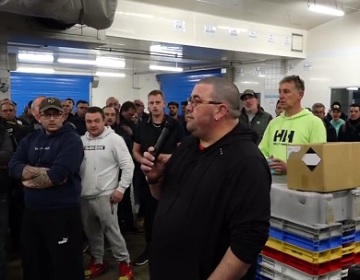
Angry, Breton fishermen on strike!
It would seem that it is not only Uk fishermen that are troubled by the position they find themselves in with regard to quotas, increasingly demanding NGOs, fuel costs and a general increase in what seem unworkable rules and regulations being forced upon them In Brittany, which is home to some of the largest ports in France fishermen – including company boats – are taking action today and effectively going on strike by staying in port. If such action were to be contemplated here in Cornwall say, it would be good to think the company boats would also mirror their Breton cousins and stay in port. Video, >click to read< 09:05
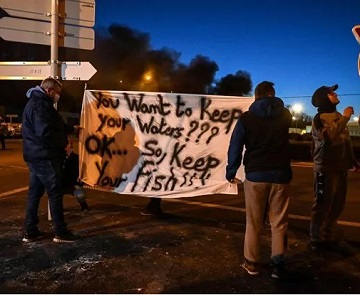
Furious fishermen block France’s largest port in row over EU rules to eliminate trawling
French fishermen protesting against a European Union project to restrict bottom fishing symbolically blocked the main French fishing port, Boulogne-sur-Mer, on Sunday evening, the prefecture and the regional fisheries committee said. Seven fishing boats enacted a blockade at the entrance to the port, the prefecture said. Olivier Leprêtre, president of the Hauts-de-France regional fisheries committee told AFP the EU Commission’s plan “would be the death of the port of Boulogne”. He pointed out that with such a measure only 20 percent of the waters of the Pas-de-Calais Strait would remain accessible to fishing. >click to read< 09:01
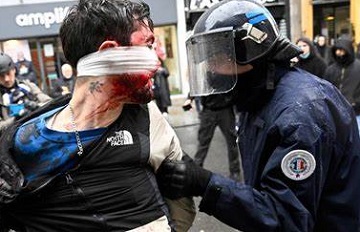
French protesters throw live crabs at police during bloody clashes at fishing rally
Hundreds of angry fishermen gathered in Rennes, France, to protest worrying recommendations made by the country’s Council of State in relation to the costly carbonisation of the sector. Olivier Le Nézet, head of the country’s National Fisheries Committee, went on to say the treatment of the industry has evoked “aggressions”, with French fleets being decreased by more than a quarter in 20 years. The ill-feeling came to a head earlier this week when the highest administrative court, the Council of State, gave the government six months to close some fishing areas in the Atlantic. >click to read< 12:46

‘Our fish first!’ Post-Brexit fisheries deal signed by Macron sparks furious Frexit calls
Calls for France to leave the EU have reignited as Emmanuel Macron’s government fails to safeguard the interest of French fishermen after Brexit. Brussels has been accused of “organising the disappearance of the small-scale fishing industry” in France as a post-Brexit deal signed by Emmanuel Macron will force French fishermen’s catches out of their own markets to the advantage of British ones. Emmanuel Macron’s government has agreed to open up the Breton fish markets to fish caught by British vessels, something that infuriated French right-wing politicians. >click to read< 15:47
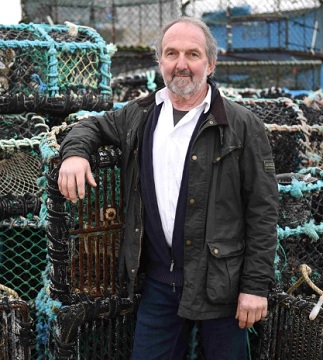
Fishing licence plan ‘bordering on naive’
The government’s plan to prevent French fishing boats depleting stocks in Jersey’s waters is ‘bordering on the naive’, according to local fishermen – as temporary licences allowing European vessels access to local waters expire next week. Jersey Fishermen’s Association president Don Thompson said he feared the 136 French boats licensed to fish in the Island’s territorial waters might decrease in number over time but retiring boats would be replaced by larger, more efficient vessels. These boats would quickly be able to wipe out rich grounds around the Island, such as scallop beds near the Minquiers, leaving Jersey fishermen with little to catch, Mr Thompson told the Environment, Housing and Infrastructure Scrutiny Panel yesterday. >click to read< 12:37
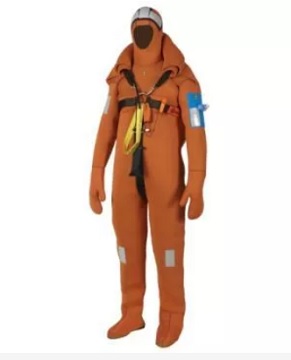
Daniel Rigolet: the inventor of the survival suit
Although he was not well known, it is interesting to look back at the life of this man who saved many lives at sea. Born in the Paris region in 1930, Daniel Rigolet was already a seasoned sailor and oil tanker captain in 1971 when he came up with the idea of the survival suit. After starting out as a midshipman in sardine fishing, he trained until he reached the position of captain. That year, the tragic sinking of the cargo ship Maori in the Bay of Biscay occurred. Out of a total of 39 sailors, only one survived. He was saved from the cold November waters by the idea of putting on his diving suit. By keeping him warm, it saved his life. photos, >click to read< 07:55
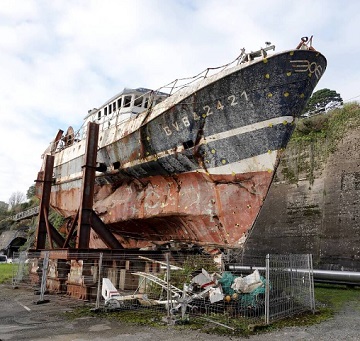
The Bugaled Breizh, sunk in 2004, will leave the Brest arsenal to be dismantled
On January 15, 2023, it will be nineteen years since the trawler Bugaled Breizh of Loctudy (Finistère), sank in less than a minute off Cape Lizard (United Kingdom), a shipwreck that had resulted in the death of the five sailors on board. Since July 2004 and the refloating of the ship for the purposes of the investigation, the wreck is stored out of sight on the naval military base of Brest. Legal proceedings are extinguished on both sides of the Channel. In France, a dismissal order was issued and confirmed in 2016. In Great Britain, the justice concluded in 2021 to a fishing accident to explain the sinking. A thesis firmly refuted by relatives of the victims, who maintain that a submarine would be at the origin of this fatal shipwreck. photos, external links, >click to read< 15:46
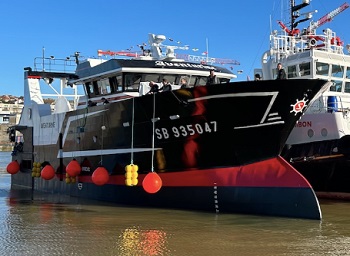
The Porcher Fleet Continues to Grow
Aventurine was built in less than a year by the shipyard in Boulogne for its loyal customer in Côtes-d’Armor. It will be based in Saint-Brieuc, also its port of registry. With an 25 metre overall length and an 8 metre beam, the new trawler has a steel hull, aluminium superstructure and seven winches. Propulsion is provided by a CAT3512C main engine driving a France Helice HPV 804G variable pitch propeller. The new trawler’s skipper, Antoine Porcher, 26 years old and grandson of the company’s owner Jean Porcher, appreciates the innovations that have gone into Aventurine. Video, photos, >click to read< 16:47
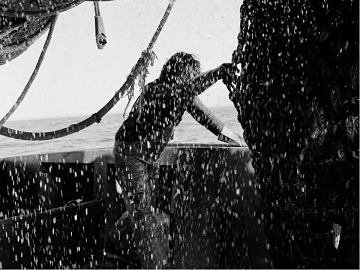
A Journey with French Fishermen
Usually, a crew consists of three to four people. The captain, who is frequently the owner of the fishing boat, is the oldest and most experienced. There are often also a few very young crew members. Many Senegalese fishermen find work on the boats. . In particular, I spent a lot of time with the crew of the fishing boat le Petit Maylise. I met Benoit first. It was a Friday morning, a day dedicated to repairing the boat and nets after days at sea. I saw a solitary silhouette from afar, bent over the nets, bathed in the soft light of rare sunny days in Normandy. The scene had something extremely spiritual about it. I introduced myself to Benoit and immediately got a great feeling from him. Then I met the other crew members: the captain, Jean Philippe; Aurielen; and young Mathis and Dylan. Photos, >click to read< 13:46
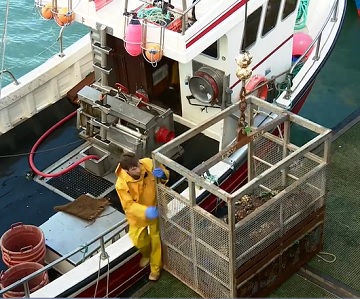
Fishermen warn Jersey’s marine industry ‘cannot survive’ without assistance
Jersey‘s fishing industry is at risk as long-standing fishermen leave the job, saying they simply ‘cannot survive anymore’. In the last few years, the fleet has dropped from around 60 to 30 boats, and some have even moved to the UK where they can make more money. Fishermen blame ongoing tensions with France over licences and the rising cost of bait and fuel for the industry now reaching ‘crisis point’. Video, >click to read< 08:48
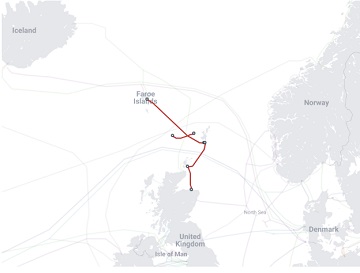
Fiber-optic Submarine Cable near Faroe and Shetland Islands Damaged; Mediterranean Cables also Cut
Last week the SHEFA-2 undersea cable linking the Faroe Islands to mainland Scotland via the Shetland and Orkney Islands was damaged in two separate incidents leaving much of the islands without internet connection. In the south of France three key subsea cables connecting the city of Marseille to Lyon, Milan, and Barcelona were purposely cut, the cable’s operator reported, impacting internet connectivity worldwide. While French authorities suspect an act of sabotage, their Scottish counterparts remain more cautious about what caused the damage to the cables. Similar to the Svalbard cable incidents, in which Russian fishing vessels passed repeatedly over the areas where the cables were located, police investigating the Faroe and Shetland incidents suggested that it was likely fishing vessels, which damaged the cables. >click to read< 09:19
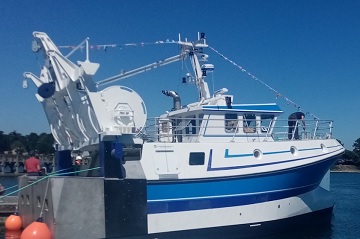
New Scalloper/Trawler for Le Havre
With a length of 11.98 metres and a breadth of 6 metres, Pierre Becquet’s new fishing boat was launched on 13th July at Locmiquélic in Morbihan. It will be delivered in August to the port of Le Havre, where the owner already runs the P’tit Pierre (ex-Tigrou), built in 2005 by the same yard as P’tit Gabin, Chantiers Navals Bernard. It is expected be ready and operational before the next scallop season. Photos, >click to read< 11:42
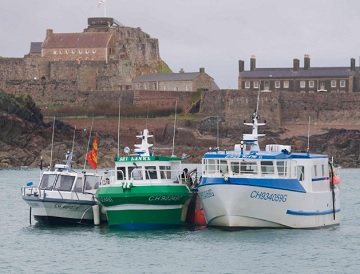
French and Jersey fishermen meet for first time since Harbour blockade
The meeting this month was the first since Norman and Breton fishing vessels blockaded the Harbour in May last year in a protest over post-Brexit fishing rights. Relations deteriorated to such an extent last summer that the UK sent two naval vessels to Jersey in response to the blockade and some French politicians threatened to cut off the Island’s electricity supply. The president of the Jersey Fishermen’s Association, Don Thompson, said the meetings were an important first step in improving relations with their French counterparts. ‘We invited the French fishermen and representatives to Jersey for this first meeting,’ Mr Thompson said. ‘We are working for solutions. Typical of fishermen, the meeting was very forthright. We got right to the point and did not hold back.’ >click to read< 10:20
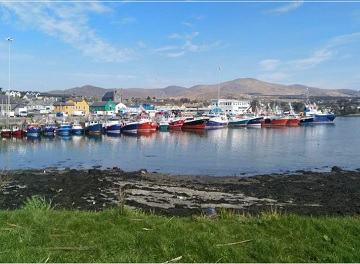
That Was Quick!: French Navy backs down from West Cork fishermen
Simon Coveney confirms French navy will stay outside of Irish waters during their upcoming exercises having come under pressure from West Cork fishermen. The French Navy were planning a huge exercise – involving missile tests – off our southwest coast later this week and it was set to be even bigger than the one the Russians had to postpone earlier this year. However, as the Russians found out, the French Atlantic fleet had to reckon with Irish South and West Fish Producers Organisation, with their headquarters in Castletownbere. >click to read< 17:15
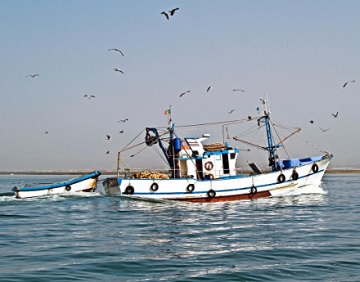
Irish fishermen who faced down Russians now to protest against French navy’s military drills
Irish fishermen confirmed they are to mount major protests off the south-west coast in a bid to prevent the French navy staging military exercises later this month in important fishing grounds. The protests will mirror the demonstrations planned by west Cork fishermen last January to disrupt planned military exercises by the Russian navy in fishing waters off the south-west coast. French naval forces are planning an exercise for June 23-25,,, “The Albacore tuna fishery is opening for Irish vessels on June 23,,, >click to read< 07:35
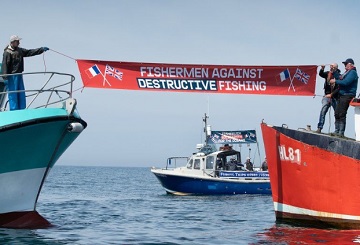
Channel fishermen protest to ban supertrawlers, fly-shooters
Fishermen from the UK and France have met in the English Channel to protest against industrial fishing practices. Boats from Dover, Rye, Newhaven and Boulogne-sur-mer gathered in the Bassurelle Sandbank marine protected area. They called for politicians to ban supertrawlers and fly-shooting from protected Channel waters. The Department for Environment, Food and Rural Affairs (Defra) said vessels must follow UK sustainability rules. >click to read< 12:33






